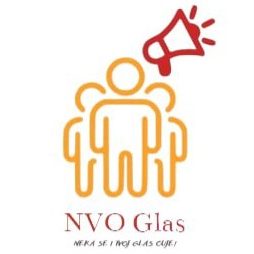NVO GLAS nastavlja seriju intervjua u okviru regionalnog projekta „Youth Engagement for Europeanization of the Balkans“, kroz koje predstavljamo stavove i iskustva mladih i omladinskih lidera o ulozi generacije koja dolazi u evropskim integracijama. Ovaj put razgovarali smo sa Vladimirom Perazićem, generalnim sekretarom Mreže za mlade Crne Gore (MMCG), a intervju je vodila Milica Dedić, izvršna direktorica NVO GLAS.
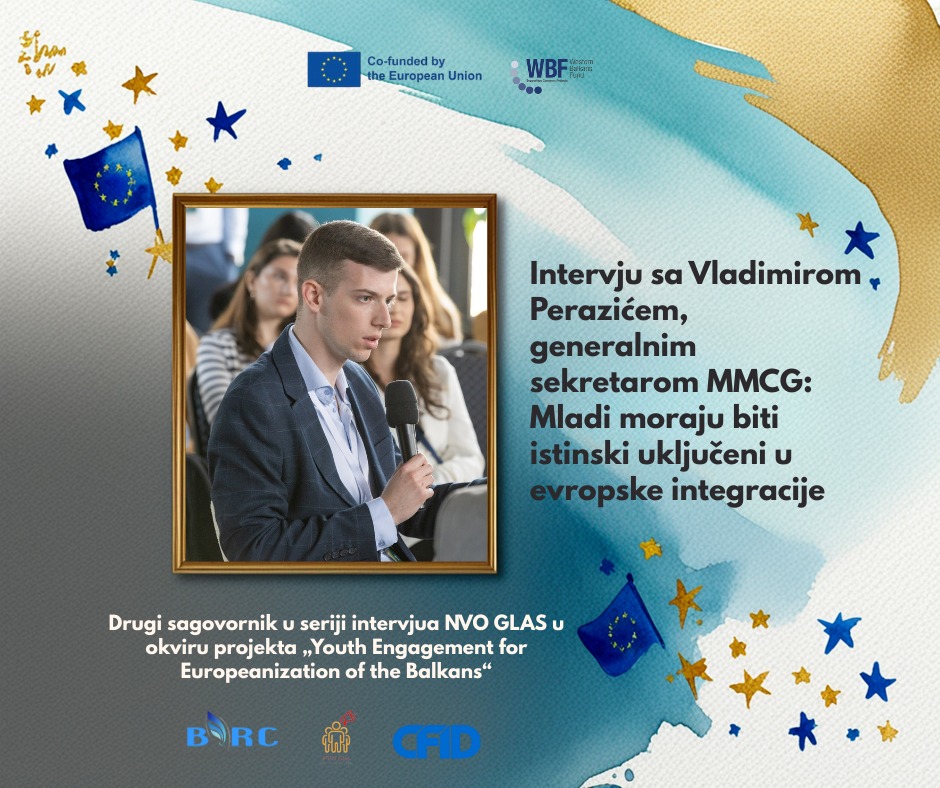
Mreža za mlade Crne Gore predstavlja krovnu organizaciju koja okuplja omladinske strukture, organizacije i inicijative širom zemlje sa ciljem jačanja glasova mladih u procesima donošenja odluka, unapređenja politika za mlade i jačanja regionalne i evropske saradnje.
Vladimir Perazić je omladinski lider sa bogatim iskustvom u razvoju i zagovaranju politika za mlade. Kao generalni sekretar Mreže, aktivno radi na smisljenoj participaciji mladih u donošenju odluka. Član je Nacionalnog savjeta za mlade, radnih grupa za Zakon o mladima, Garanciju za mlade, kao i pregovaračkog Poglavlja 26 – Obrazovanje i kultura. Njegovo djelovanje usmjereno je na povezivanje mladih sa institucijama i donosiocima odluka, promociju regionalne saradnje i jačanje kapaciteta mladih da budu aktivni učesnici u društvu i evropskim integracijama.
U razgovoru za naš projekat, Perazić govori o trenutnoj ulozi mladih u evropskim integracijama i prostorima za napredak, njihovoj informisanosti i spremnosti za uključivanje, značaju regionalne saradnje i razmjene iskustava, ulozi u promociji evropskih vrijednosti, izazovima u dostupnosti EU programa i fondova, te poruci koju upućuje i mladima i donosiocima odluka u izgradnji evropske budućnosti.
Cjelokupan intervju možete pročitati u nastavku.
NVO GLAS: Kako vidite trenutnu ulogu mladih u procesima evropskih integracija i gdje postoji najviše prostora za napredak?
Vladimir: Mladi u Crnoj Gori danas nijesu dovoljno uključeni u procese evropskih integracija. Njihova uloga se često svodi na formalno prisustvo ili simboličnu reprezentaciju, umjesto na stvarno učešće u donošenju odluka. Neophodno je osigurati smislenu participaciju mladih, što znači uključivanje u kreiranje politika, a ne samo njihovo komentarisanje ili predstavljanje na događajima.
Posebno je važno pomenuti Poglavlje 26 – Obrazovanje i kultura, koje je direktno vezano za mlade. Ono je već duže vrijeme privremeno zatvoreno, budući da su ispunjena mjerila koja su bila potrebna. Ipak, to ne znači da se mladi trebaju baviti isključivo tim poglavljem – njihovo mjesto postoji i u ključnim oblastima poput Poglavlja 23 i 24, koje utiču na vladavinu prava i ljudska prava, a time i na položaj mladih.
Nalazi iz regionalnih istraživanja pokazuju da većina mladih u regionu sebe vidi kao nedovoljno zastupljene u procesima politike, što potvrđuje da postoji ogroman prostor za napredak u institucionalizovanju njihovog glasa i uključivanja u pregovaračke strukture.
NVO GLAS: Koliko su mladi u Crnoj Gori informisani o EU integracijama i koliko su spremni da se uključe?
Vladimir: Generalno, mladi u Crnoj Gori nijesu dovoljno informisani o tome šta proces evropskih integracija znači u praksi. Mnogi ga povezuju samo sa formalnim članstvom u EU, dok ne prepoznaju da pregovori obuhvataju reforme koje direktno utiču na njihov svakodnevni život – obrazovanje, zapošljavanje, slobodu kretanja, prava i standarde.
Upravo iz tog razloga, Mreža za mlade Crne Gore trenutno realizuje projekat u okviru kojeg će se organizovati edukativni modul posvećen pregovaračkim poglavljima – posebno 23, 24 i 26. Na taj način mladima će se približiti značaj evropskih integracija i omogućiti im da bolje razumiju proces. Spremnost mladih da se uključe je velika, ali ključni izazov ostaje nedostatak pravovremenih i razumljivih informacija.
NVO GLAS: Koliko su mladi iz Crne Gore otvoreni za razmjenu znanja i iskustava sa vršnjacima iz regiona i kako ta saradnja doprinosi evropskom identitetu?
Vladimir: Mladi u Crnoj Gori su i više nego otvoreni za razmjenu znanja i iskustava sa vršnjacima iz regiona. Regionalni forumi, omladinske razmjene i zajedničke inicijative pokazuju da mladi veoma lako pronalaze zajednički jezik i interese. Upravo u tim procesima nestaju predrasude, prevazilaze se barijere i stvara osjećaj zajedničkog evropskog identiteta.
Kada učestvuju na evropskim događajima, mladi sa Zapadnog Balkana gotovo uvijek nastupaju zajedno, što dodatno pokazuje da region funkcioniše kao prirodan prostor saradnje. To je veliki kapital za budućnost integracija.
NVO GLAS: Kako vidite doprinos mladih u promovisanju temeljnih vrijednosti EU (multikulturalizam, solidarnost, ljudska prava), i imate li primjer dobre prakse iz rada Mreže za mlade?
Vladimir: Mladi su najjači promoteri evropskih vrijednosti. Oni najlakše usvajaju principe solidarnosti, multikulturalizma i ljudskih prava, jer upravo njima pripada budućnost u kojoj te vrijednosti treba da zažive.
Primjer dobre prakse je članstvo Mreže za mlade Crne Gore u regionalnoj platformi Connecting Youth, kao i u inicijativi Youth Alert, koja okuplja sve krovne saveze iz regiona. Kroz zajedničke projekte i zagovaračke inicijative, mladi pokazuju kako saradnja može da funkcioniše iznad nacionalnih granica, utemeljena na univerzalnim evropskim vrijednostima.
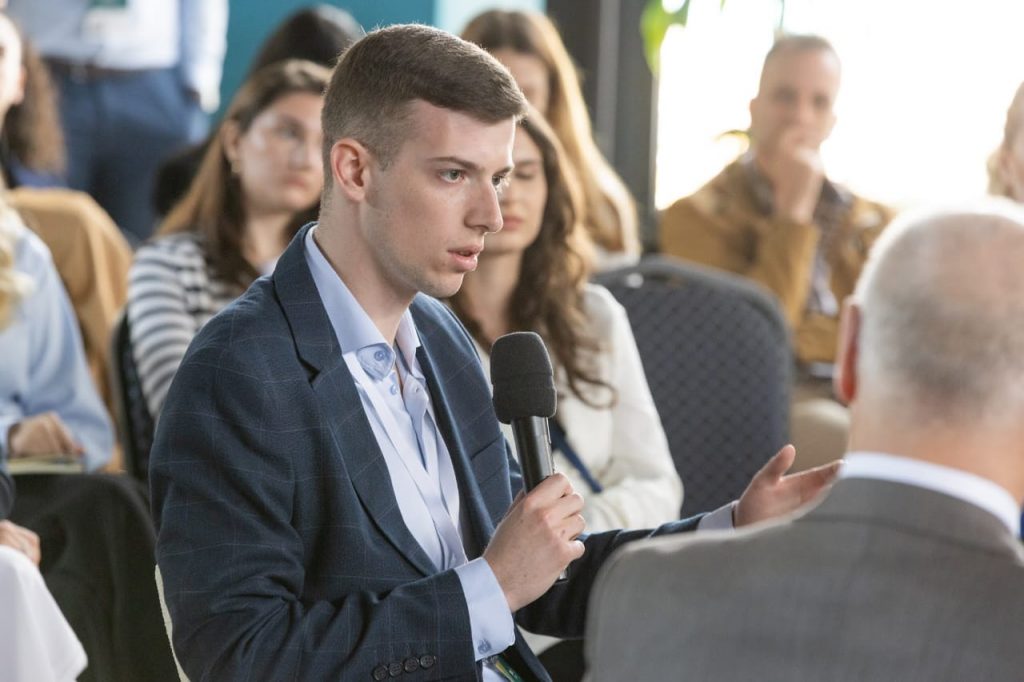
NVO GLAS: Koliko su mladi u Crnoj Gori upoznati s EU programima i fondovima i šta bi trebalo unaprijediti?
Vladimir: Iako postoje brojne prilike kroz EU programe poput Erasmus+, Evropskog solidarnog korpusa i drugih fondova, mladi u Crnoj Gori nijesu dovoljno informisani o načinima učešća. Glavni izazov je nedostatak dostupnih i jednostavno objašnjenih informacija.
Potrebno je jačati peer-to-peer edukaciju, odnosno vršnjačke radionice gdje mladi koji su već učestvovali u programima dijele svoja iskustva. To ima najveći motivacioni efekat i podstiče druge mlade da se uključe.
NVO GLAS: Kako regionalna saradnja može doprinijeti zajedničkom napretku ka članstvu u EU?
Vladimir: Regionalna saradnja je jedan od ključnih instrumenata u procesu integracija. Ona omogućava da se kroz razmjenu iskustava uči iz dobrih, ali i loših praksi susjednih zemalja.
Primjer je mehanizam Garancije za mlade, koji se već implementira u Sjevernoj Makedoniji i Srbiji, dok se ove godine pilotira i u Crnoj Gori. Iskustva iz regiona pomažu da se izbjegnu greške i da se primijene provjereni modeli. Na taj način se ubrzava i olakšava naš put ka EU.
NVO GLAS: Koju poruku biste uputili mladima i kreatorima politika o važnosti uključivanja mladih u izgradnji evropske budućnosti?
Vladimir: Moja poruka mladima je da budu budni, informisani i proaktivni. Evropska budućnost neće doći sama – potrebno je da je gradimo mi. Najbolji način da se to postigne jeste da mladi istražuju sve prilike i traže načine da se uključe.
Kreatorima politika poruka je jasna: mladi ne smiju biti prisutni samo kada se fotografišemo. Potrebno je da donosioci odluka traže mišljenje mladih i da taj feedback uvažavaju. Samo tako će proces evropskih integracija biti inkluzivan i održiv.
Razgovor sa Vladimirom Perazićem pokazuje da su mladi u Crnoj Gori i regionu spremni za aktivno učešće, ali im je potrebno više prilika i bolje informacije da bi se njihov glas čuo. Poseban značaj ima njihova uloga u procesima donošenja odluka i promociji evropskih vrijednosti, a organizacije poput Mreže za mlade Crne Gore daju važan doprinos osnaživanju i povezivanju mladih.
Regionalni projekat „Youth Engagement for Europeanization of the Balkans“ realizuje se u partnerstvu sa organizacijom BIRC iz Sjeverne Makedonije (nosilac projekta), CFID sa Kosova i NVO GLAS iz Crne Gore, uz podršku Western Balkans Fund-a i kofinansiranje Evropske unije.
Interview with Vladimir Perazić: Young people must be genuinely involved in European integration
NVO GLAS continues the series of interviews within the regional project “Youth Engagement for Europeanization of the Balkans”, through which we present the views and experiences of young people and youth leaders on the role of the coming generation in European integration. This time we spoke with Vladimir Perazić, Secretary General of the National Youth Network of Montenegro, and the interview was conducted by Milica Dedić, Executive Director of NVO GLAS.
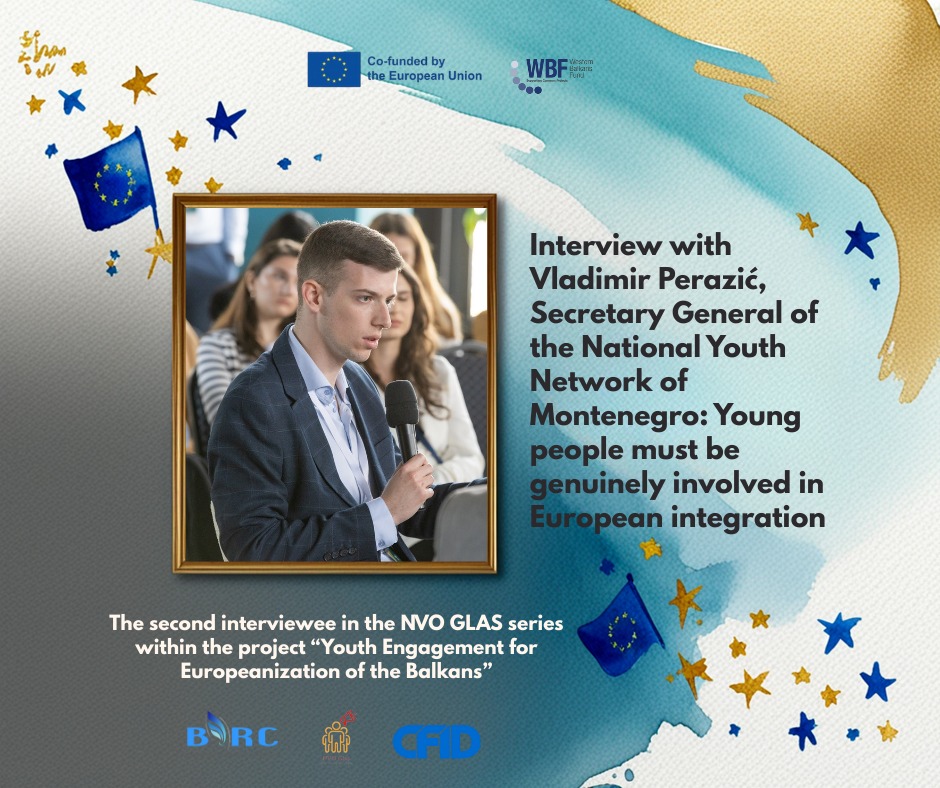
The National Youth Network of Montenegro represents an umbrella organization that gathers youth structures, organizations, and initiatives throughout the country with the aim of strengthening the voices of young people in decision-making processes, improving youth policies, and enhancing regional and European cooperation.
Vladimir Perazić is a youth leader with rich experience in the development and advocacy of youth policies. As Secretary General of the National Youth Network of Montenegro, he actively works on meaningful participation of young people in decision-making. He is a member of the National Youth Council, working groups for the Law on Youth, the Youth Guarantee, as well as the negotiation Chapter 26 – Education and Culture. His activities are directed toward connecting young people with institutions and decision-makers, promoting regional cooperation, and strengthening the capacities of youth to be active participants in society and European integration.
In the conversation for our project, Perazić speaks about the current role of young people in European integration and areas for progress, their level of information and readiness for involvement, the importance of regional cooperation and exchange of experiences, their role in promoting European values, the challenges in accessing EU programs and funds, as well as the message he addresses to both young people and decision-makers in building a European future.
The full interview can be read below.
NVO GLAS: How do you see the current role of young people in the processes of European integration and where is there the most room for progress?
Vladimir: Young people in Montenegro today are not sufficiently involved in the processes of European integration. Their role is often reduced to formal presence or symbolic representation, instead of real participation in decision-making. It is necessary to ensure meaningful youth participation, which means involvement in policy creation, not just commenting on them or representing them at events.It is especially important to mention Chapter 26 – Education and Culture, which is directly related to young people. It has been temporarily closed for a long time, as the benchmarks that were required have been met. However, this does not mean that young people should deal exclusively with that chapter – their place also exists in key areas such as Chapters 23 and 24, which affect the rule of law and human rights, and thus the position of young people.
Findings from regional research show that most young people in the region see themselves as underrepresented in political processes, which confirms that there is enormous room for progress in institutionalizing their voice and involvement in negotiation structures.
NVO GLAS: How informed are young people in Montenegro about EU integration and how ready are they to get involved?
Vladimir: Generally, young people in Montenegro are not sufficiently informed about what the process of European integration means in practice. Many associate it only with formal EU membership, while they do not recognize that negotiations involve reforms that directly affect their everyday life – education, employment, freedom of movement, rights, and standards.
For that very reason, the National Youth Network of Montenegro is currently implementing a project within which an educational module dedicated to the negotiation chapters – especially 23, 24, and 26 – will be organized. In this way, young people will gain a better understanding of the significance of European integration and be enabled to understand the process better. The readiness of young people to get involved is high, but the key challenge remains the lack of timely and understandable information.
NVO GLAS: How open are young people from Montenegro to exchanging knowledge and experiences with peers from the region, and how does this cooperation contribute to a European identity?
Vladimir: Young people in Montenegro are more than open to exchanging knowledge and experiences with peers from the region. Regional forums, youth exchanges, and joint initiatives show that young people very easily find common language and interests. It is precisely in these processes that prejudices disappear, barriers are overcome, and a sense of shared European identity is created.
When participating in European events, young people from the Western Balkans almost always act together, which further shows that the region functions as a natural space for cooperation. This is a great asset for the future of integration.
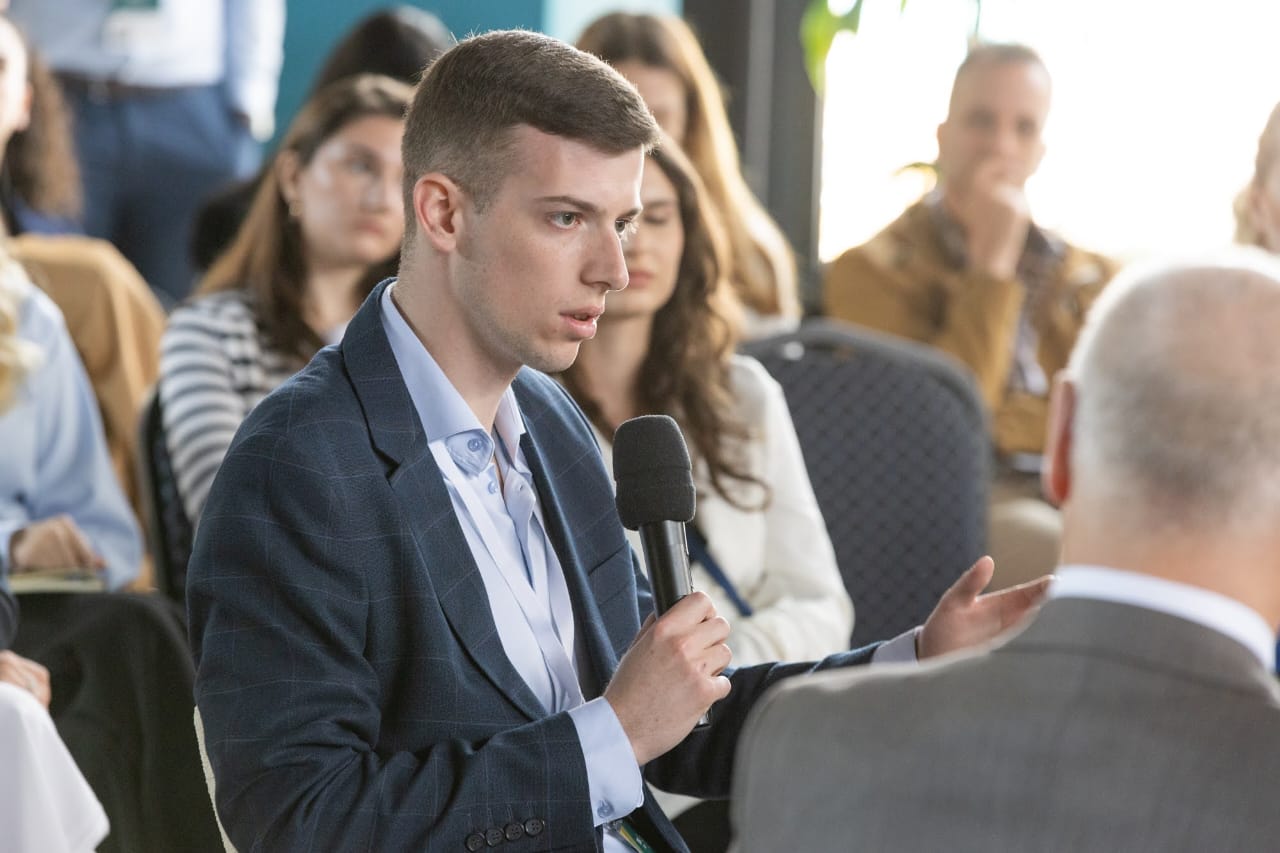
NVO GLAS: How do you see the contribution of young people in promoting the fundamental values of the EU (multiculturalism, solidarity, human rights), and do you have an example of good practice from the work of the National Youth Network of Montenegro?
Vladimir: Young people are the strongest promoters of European values. They adopt the principles of solidarity, multiculturalism, and human rights most easily, because precisely to them belongs the future in which these values should live.
An example of good practice is the membership of the National Youth Network of Montenegro in the regional platform Connecting Youth, as well as in the Youth Alert initiative, which brings together all umbrella youth councils from the region. Through joint projects and advocacy initiatives, young people show how cooperation can function beyond national borders, based on universal European values.
NVO GLAS: How familiar are young people in Montenegro with EU programs and funds, and what should be improved?
Vladimir: Although there are numerous opportunities through EU programs such as Erasmus+, the European Solidarity Corps, and other funds, young people in Montenegro are not sufficiently informed about ways of participation. The main challenge is the lack of available and simply explained information.
It is necessary to strengthen peer-to-peer education, that is, youth workshops where young people who have already participated in programs share their experiences. This has the greatest motivational effect and encourages other young people to get involved.
NVO GLAS: How can regional cooperation contribute to the joint progress toward EU membership?
Vladimir: Regional cooperation is one of the key instruments in the integration process. It allows learning from both the good and bad practices of neighboring countries through the exchange of experiences.
An example is the Youth Guarantee mechanism, which is already being implemented in North Macedonia and Serbia, while this year it is being piloted in Montenegro. Experiences from the region help to avoid mistakes and apply proven models. In this way, our path to the EU is accelerated and facilitated.
NVO GLAS: What message would you send to young people and policymakers about the importance of involving young people in building a European future?
Vladimir: My message to young people is to be alert, informed, and proactive. The European future will not come by itself – it is necessary that we build it. The best way to achieve this is for young people to explore all opportunities and seek ways to get involved.
The message to policymakers is clear: young people must not be present only when we take photos. It is necessary that decision-makers seek the opinions of young people and take that feedback into account. Only in this way will the process of European integration be inclusive and sustainable.
The conversation with Vladimir Perazić shows that young people in Montenegro and the region are ready for active participation, but they need more opportunities and better information for their voices to be heard. Their role in decision-making processes and in promoting European values is of particular importance, and organizations such as the National Youth Council of Montenegro make an important contribution to empowering and connecting young people.
The regional project “Youth Engagement for Europeanization of the Balkans” is being implemented in partnership with the organization BIRC from North Macedonia (project lead), CFID from Kosovo, and NVO GLAS from Montenegro, with the support of the Western Balkans Fund and co-financing from the European Union.
